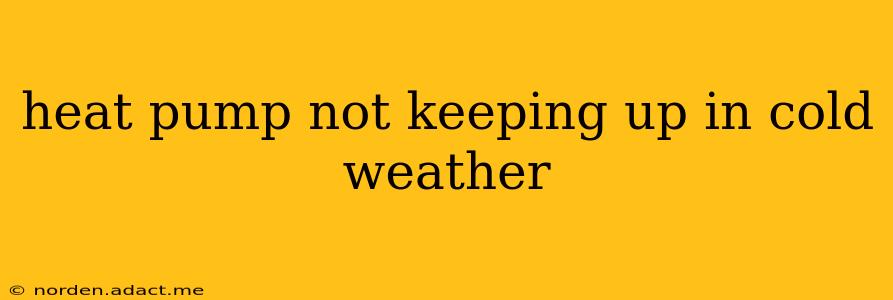Heat pumps are energy-efficient heating and cooling systems, but their performance can falter in extremely cold weather. If your heat pump isn't keeping up in the cold, it's not necessarily a sign of failure. Several factors can contribute to reduced heating capacity in freezing temperatures, and understanding these issues is crucial for effective troubleshooting and maintaining a comfortable home.
Why Isn't My Heat Pump Keeping Up in Cold Weather?
This is a common question among heat pump owners, and several factors contribute to decreased efficiency in frigid conditions:
-
Lower Refrigerant Efficiency: Heat pumps rely on refrigerant to transfer heat. In extremely cold temperatures, the refrigerant's ability to absorb and release heat diminishes, reducing the overall heating output. This is a fundamental aspect of heat pump technology; they aren't designed to perform optimally below certain temperatures.
-
Frost Buildup: Ice formation on the outdoor unit's evaporator coil restricts airflow and significantly reduces the heat pump's ability to extract heat from the outside air. This is a more significant problem in consistently humid, sub-freezing conditions.
-
Insufficient Airflow: Restricted airflow, whether due to dirty air filters, blocked vents, or frozen coils, prevents efficient heat distribution throughout your home. Poor airflow can severely impact performance, even on milder days.
-
Improper Installation or Sizing: A heat pump that's improperly sized or installed for your home's specific needs might struggle to meet heating demands, especially in cold weather. This should be addressed by a qualified HVAC professional.
What Should I Do if My Heat Pump Isn't Heating My Home?
Before calling a technician, you can take a few steps to troubleshoot the issue:
1. Check Your Air Filter:
A clogged air filter restricts airflow, reducing heating efficiency. Change or clean your air filter—this is often the easiest and most effective first step.
2. Inspect the Outdoor Unit:
Carefully examine the outdoor unit for ice buildup. While some frost is normal, excessive accumulation will hamper performance. Do not attempt to manually remove ice with hot water or other forceful methods. This could damage the unit.
3. Check Vents and Registers:
Ensure all vents and registers in your home are open and unobstructed. Closed vents or blocked registers impede airflow, making it challenging for the heat pump to heat your home effectively.
Is My Heat Pump Broken? When Should I Call a Technician?
While the above steps might resolve minor issues, persistent problems require professional help. Call a qualified HVAC technician if:
- Your heat pump is consistently underperforming, even after addressing airflow and filter issues.
- You notice unusual noises from the unit.
- You suspect refrigerant leaks (indicated by a decrease in heating capacity over time).
- The outdoor unit is constantly frozen, despite attempts to address airflow issues.
Can Heat Pumps Work in Very Cold Weather?
Modern heat pumps are engineered to operate in colder climates, but their performance will inevitably decline as temperatures drop significantly. Many newer models incorporate features like auxiliary electric heaters or defrost cycles to enhance cold-weather performance. However, exceptionally cold temperatures might still challenge even the most advanced units. Understanding this limitation is crucial for managing expectations and ensuring timely maintenance.
How Can I Improve My Heat Pump's Cold Weather Performance?
Several strategies can enhance your heat pump's efficiency in cold weather:
- Regular Maintenance: Annual maintenance by a qualified technician ensures optimal performance and can identify potential problems before they escalate.
- Consider a Heat Pump with a Cold Climate Heat Pump Designation: These are specifically designed to perform better in sub-freezing temperatures.
- Insulation Upgrades: Proper insulation and sealing can significantly reduce energy consumption and improve heating effectiveness.
By understanding the factors that influence heat pump performance in cold weather and addressing potential issues proactively, you can ensure a comfortably heated home throughout the winter. Remember, preventative maintenance and prompt professional assistance are vital for maintaining the efficiency and longevity of your heat pump.
